RENAULT ZOE 2014 1.G Owner's Guide
Manufacturer: RENAULT, Model Year: 2014, Model line: ZOE, Model: RENAULT ZOE 2014 1.GPages: 214, PDF Size: 4.13 MB
Page 31 of 214
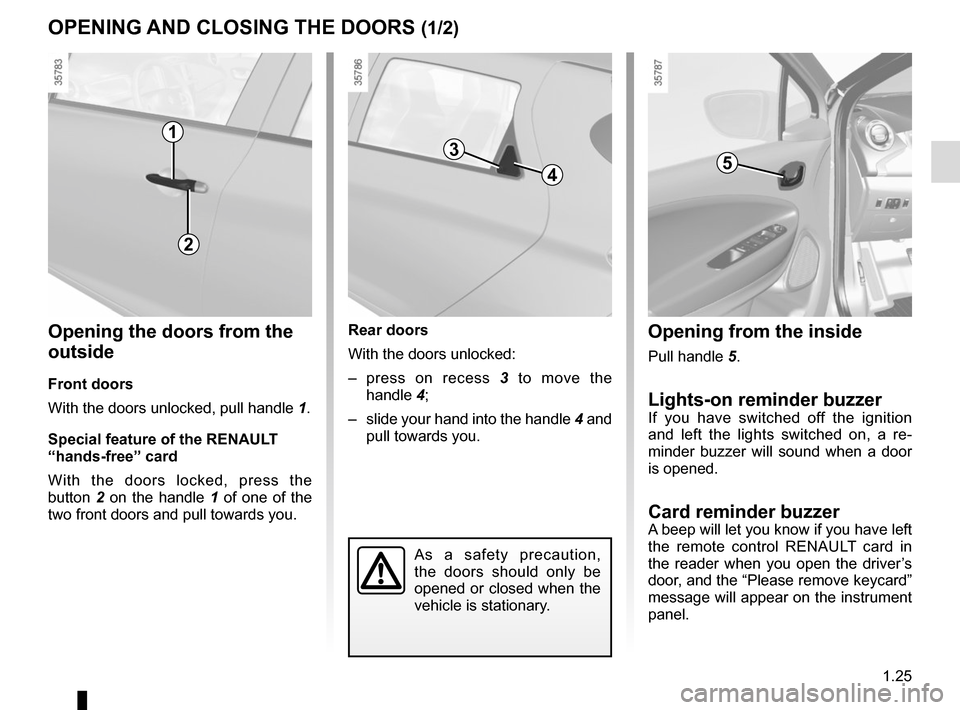
1.25
OPENING AND CLOSING THE DOORS (1/2)
Opening the doors from the
outside
Front doors
With the doors unlocked, pull handle 1.
Special feature of the RENAULT
“hands-free” card
With the doors locked, press the
button 2 on the handle 1 of one of the
two front doors and pull towards you.
Opening from the inside
Pull handle 5.
Lights-on reminder buzzerIf you have switched off the ignition
and left the lights switched on, a re-
minder buzzer will sound when a door
is opened.
Card reminder buzzerA beep will let you know if you have left
the remote control RENAULT card in
the reader when you open the driver’s
door, and the “Please remove keycard”
message will appear on the instrument
panel.
1
As a safety precaution,
the doors should only be
opened or closed when the
vehicle is stationary.
2
Rear doors
With the doors unlocked:
– press on recess 3 to move the
handle 4;
– slide your hand into the handle 4 and
pull towards you.
4
35
Page 32 of 214
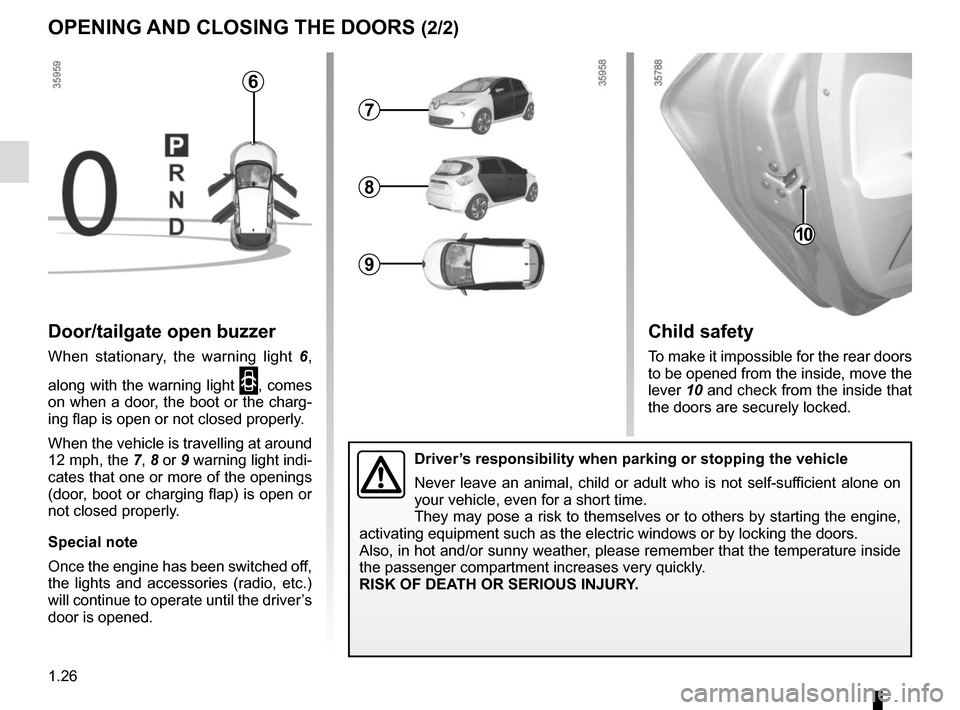
1.26
OPENING AND CLOSING THE DOORS (2/2)
Driver’s responsibility when parking or stopping the vehicle
Never leave an animal, child or adult who is not self-sufficient alone on
your vehicle, even for a short time.
They may pose a risk to themselves or to others by starting the engine, \
activating equipment such as the electric windows or by locking the door\
s.
Also, in hot and/or sunny weather, please remember that the temperature inside
the passenger compartment increases very quickly.
RISK OF DEATH OR SERIOUS INJURY.
Child safety
To make it impossible for the rear doors
to be opened from the inside, move the
lever 10 and check from the inside that
the doors are securely locked.
10
Door/tailgate open buzzer
When stationary, the warning light 6,
along with the warning light
2, comes
on when a door, the boot or the charg-
ing flap is open or not closed properly.
When the vehicle is travelling at around
12 mph, the 7, 8 or 9 warning light indi-
cates that one or more of the openings
(door, boot or charging flap) is open or
not closed properly.
Special note
Once the engine has been switched off,
the lights and accessories (radio, etc.)
will continue to operate until the driver’s
door is opened.
6
7
8
9
Page 33 of 214
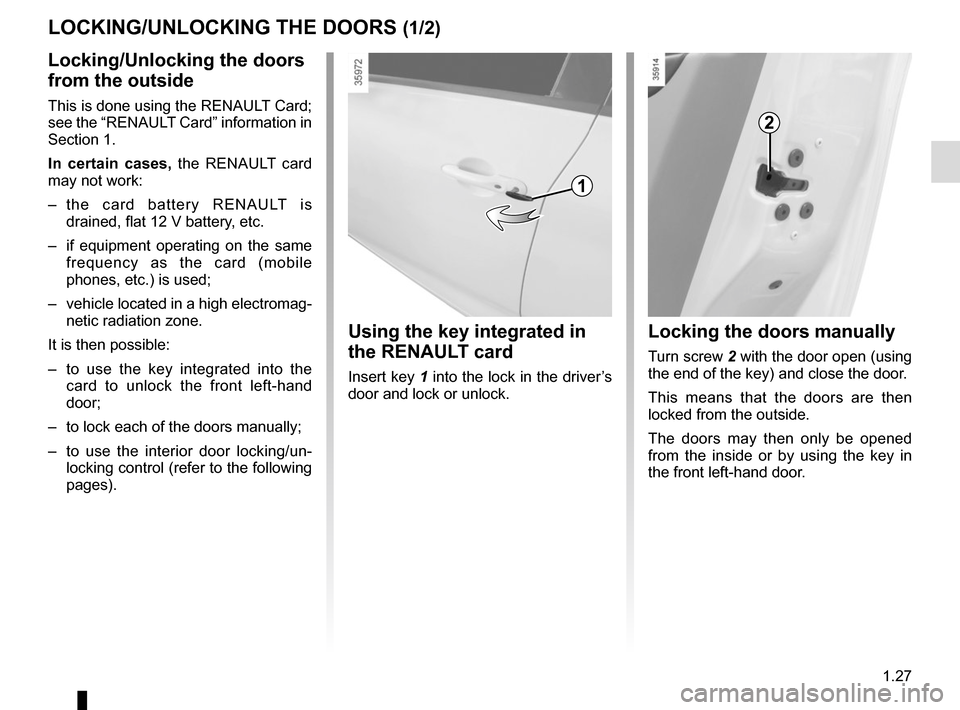
1.27
LOCKING/UNLOCKING THE DOORS (1/2)
Locking/Unlocking the doors
from the outside
This is done using the RENAULT Card;
see the “RENAULT Card” information in
Section 1.
In certain cases, the RENAULT card
may not work:
– the card battery RENAULT is drained, flat 12 V battery, etc.
– if equipment operating on the same frequency as the card (mobile
phones, etc.) is used;
– vehicle located in a high electromag- netic radiation zone.
It is then possible:
– to use the key integrated into the card to unlock the front left-hand
door;
– to lock each of the doors manually;
– to use the interior door locking/un- locking control (refer to the following
pages).
Using the key integrated in
the RENAULT card
Insert key 1 into the lock in the driver’s
door and lock or unlock.
Locking the doors manually
Turn screw 2 with the door open (using
the end of the key) and close the door.
This means that the doors are then
locked from the outside.
The doors may then only be opened
from the inside or by using the key in
the front left-hand door.
2
1
Page 34 of 214
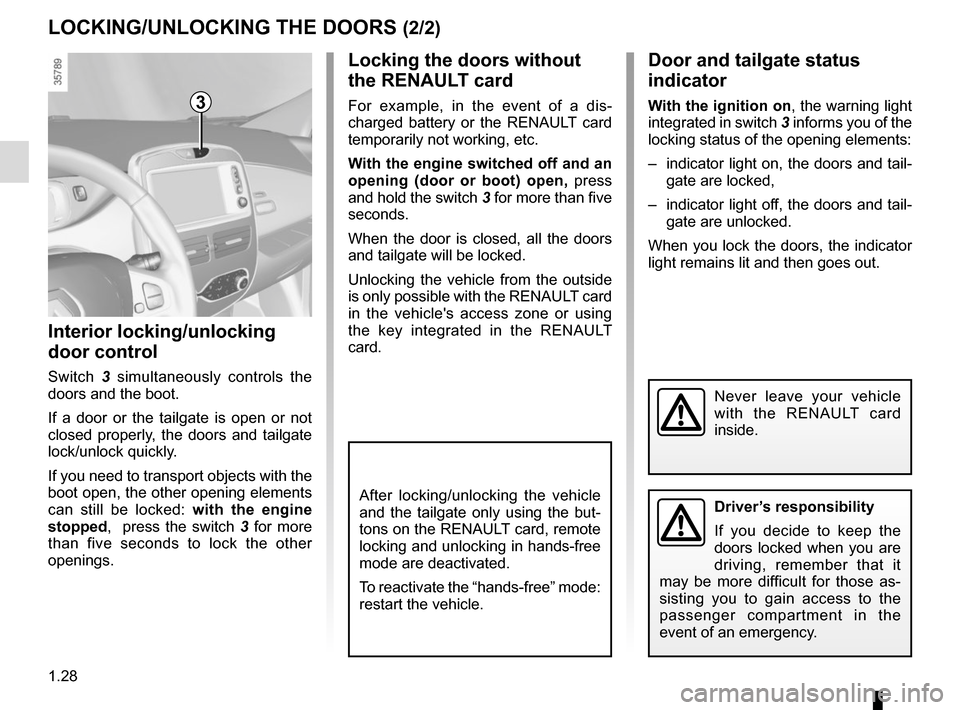
1.28
Locking the doors without
the RENAULT card
For example, in the event of a dis-
charged battery or the RENAULT card
temporarily not working, etc.
With the engine switched off and an
opening (door or boot) open, press
and hold the switch 3 for more than five
seconds.
When the door is closed, all the doors
and tailgate will be locked.
Unlocking the vehicle from the outside
is only possible with the RENAULT card
in the vehicle's access zone or using
the key integrated in the RENAULT
card.
LOCKING/UNLOCKING THE DOORS (2/2)
Interior locking/unlocking
door control
Switch 3 simultaneously controls the
doors and the boot.
If a door or the tailgate is open or not
closed properly, the doors and tailgate
lock/unlock quickly.
If you need to transport objects with the
boot open, the other opening elements
can still be locked: with the engine
stopped, press the switch 3 for more
than five seconds to lock the other
openings.
Door and tailgate status
indicator
With the ignition on , the warning light
integrated in switch 3 informs you of the
locking status of the opening elements:
– indicator light on, the doors and tail- gate are locked,
– indicator light off, the doors and tail- gate are unlocked.
When you lock the doors, the indicator
light remains lit and then goes out.
Never leave your vehicle
with the RENAULT card
inside.
After locking/unlocking the vehicle
and the tailgate only using the but-
tons on the RENAULT card, remote
locking and unlocking in hands-free
mode are deactivated.
To reactivate the “hands-free” mode:
restart the vehicle.
3
Driver’s responsibility
If you decide to keep the
doors locked when you are
driving, remember that it
may be more difficult for those as-
sisting you to gain access to the
passenger compartment in the
event of an emergency.
Page 35 of 214
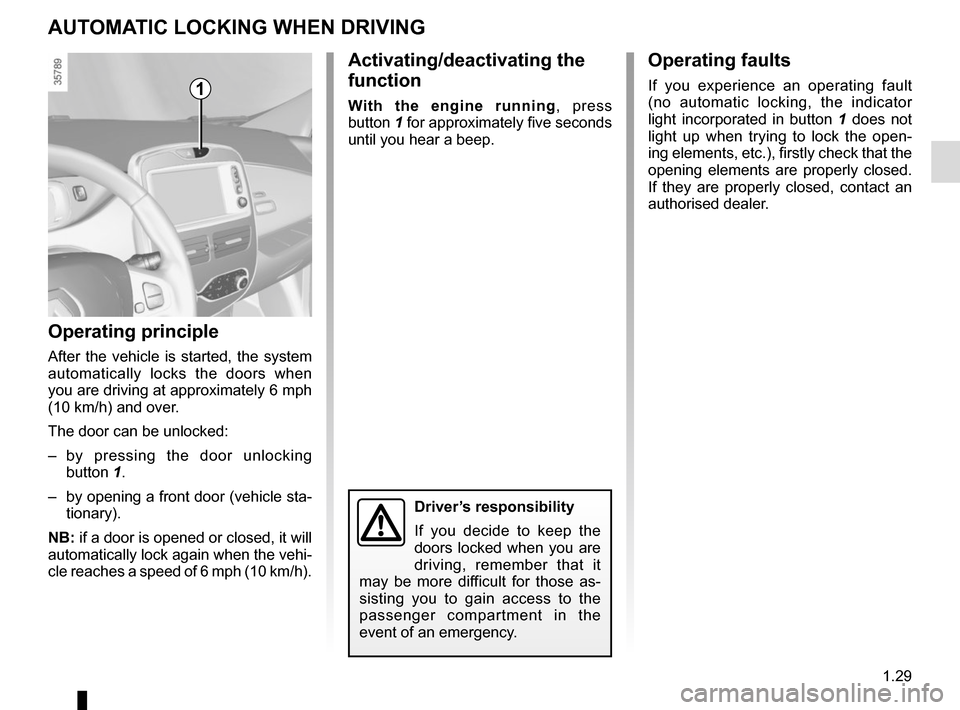
1.29
AUTOMATIC LOCKING WHEN DRIVING
Activating/deactivating the
function
With the engine running, press
button 1 for approximately five seconds
until you hear a beep.
Operating principle
After the vehicle is started, the system
automatically locks the doors when
you are driving at approximately 6 mph
(10 km/h) and over.
The door can be unlocked:
– by pressing the door unlocking button 1.
– by opening a front door (vehicle sta- tionary).
NB: if a door is opened or closed, it will
automatically lock again when the vehi-
cle reaches a speed of 6 mph (10 km/h).
Operating faults
If you experience an operating fault
(no automatic locking, the indicator
light incorporated in button 1 does not
light up when trying to lock the open-
ing elements, etc.), firstly check that the
opening elements are properly closed.
If they are properly closed, contact an
authorised dealer.1
Driver’s responsibility
If you decide to keep the
doors locked when you are
driving, remember that it
may be more difficult for those as-
sisting you to gain access to the
passenger compartment in the
event of an emergency.
Page 36 of 214
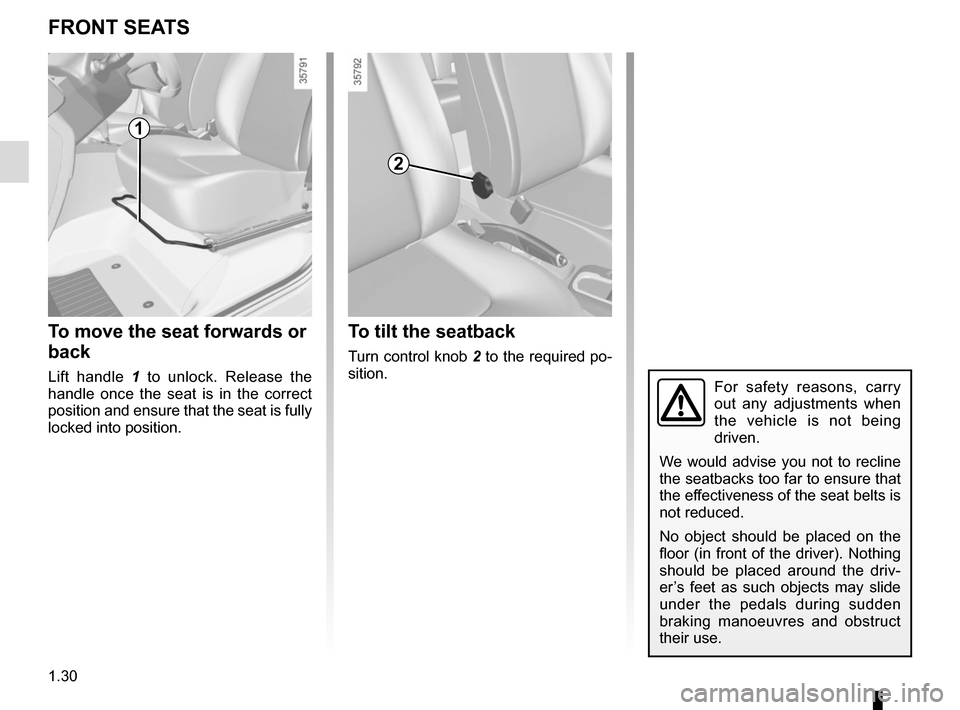
1.30
FRONT SEATS
To move the seat forwards or
back
Lift handle 1 to unlock. Release the
handle once the seat is in the correct
position and ensure that the seat is fully
locked into position.
To tilt the seatback
Turn control knob 2 to the required po-
sition.
For safety reasons, carry
out any adjustments when
the vehicle is not being
driven.
We would advise you not to recline
the seatbacks too far to ensure that
the effectiveness of the seat belts is
not reduced.
No object should be placed on the
floor (in front of the driver). Nothing
should be placed around the driv-
er’s feet as such objects may slide
under the pedals during sudden
braking manoeuvres and obstruct
their use.
1
2
Page 37 of 214
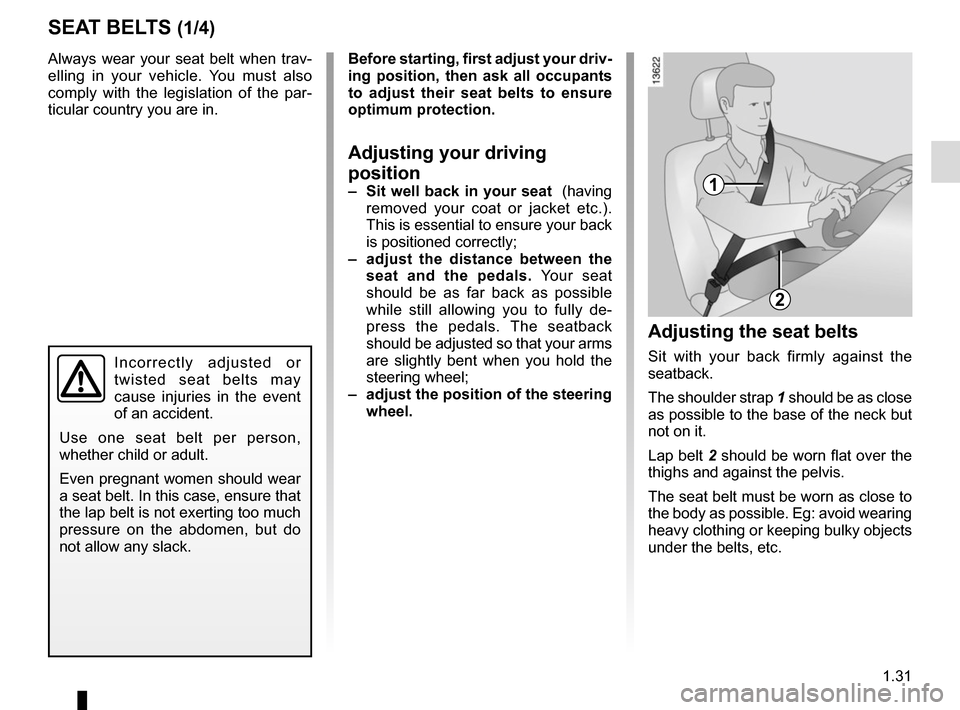
1.31
Always wear your seat belt when trav-
elling in your vehicle. You must also
comply with the legislation of the par-
ticular country you are in.
Incorrectly adjusted or
twisted seat belts may
cause injuries in the event
of an accident.
Use one seat belt per person,
whether child or adult.
Even pregnant women should wear
a seat belt. In this case, ensure that
the lap belt is not exerting too much
pressure on the abdomen, but do
not allow any slack.
Before starting, first adjust your driv-
ing position, then ask all occupants
to adjust their seat belts to ensure
optimum protection.
Adjusting your driving
position
– Sit well back in your seat (having
removed your coat or jacket etc.).
This is essential to ensure your back
is positioned correctly;
– adjust the distance between the seat and the pedals. Your seat
should be as far back as possible
while still allowing you to fully de-
press the pedals. The seatback
should be adjusted so that your arms
are slightly bent when you hold the
steering wheel;
– adjust the position of the steering
wheel.
Adjusting the seat belts
Sit with your back firmly against the
seatback.
The shoulder strap 1 should be as close
as possible to the base of the neck but
not on it.
Lap belt 2 should be worn flat over the
thighs and against the pelvis.
The seat belt must be worn as close to
the body as possible. Eg: avoid wearing
heavy clothing or keeping bulky objects
under the belts, etc.
SEAT BELTS (1/4)
1
2
Page 38 of 214
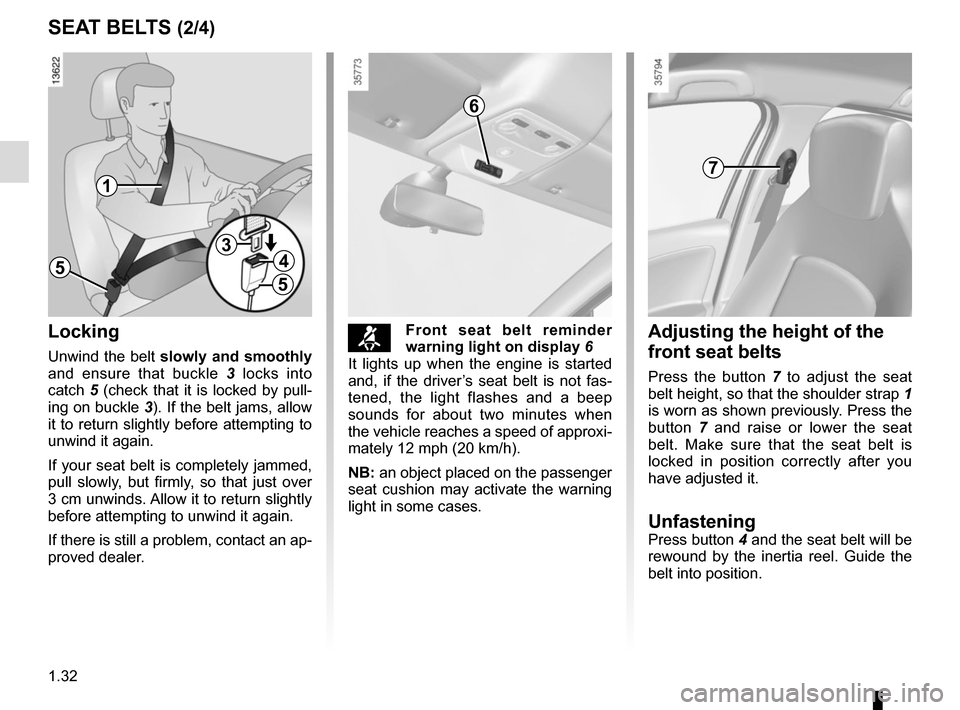
1.32
™Front seat belt reminder
warning light on display 6
It lights up when the engine is started
and, if the driver’s seat belt is not fas-
tened, the light flashes and a beep
sounds for about two minutes when
the vehicle reaches a speed of approxi-
mately 12 mph (20 km/h).
NB: an object placed on the passenger
seat cushion may activate the warning
light in some cases.
SEAT BELTS (2/4)
Locking
Unwind the belt slowly and smoothly
and ensure that buckle 3 locks into
catch 5 (check that it is locked by pull-
ing on buckle 3). If the belt jams, allow
it to return slightly before attempting to
unwind it again.
If your seat belt is completely jammed,
pull slowly, but firmly, so that just over
3 cm unwinds. Allow it to return slightly
before attempting to unwind it again.
If there is still a problem, contact an ap-
proved dealer.
1
5
34
5
Adjusting the height of the
front seat belts
Press the button 7 to adjust the seat
belt height, so that the shoulder strap 1
is worn as shown previously. Press the
button 7 and raise or lower the seat
belt. Make sure that the seat belt is
locked in position correctly after you
have adjusted it.
UnfasteningPress button 4 and the seat belt will be
rewound by the inertia reel. Guide the
belt into position.
7
6
Page 39 of 214

1.33
SEAT BELTS (3/4)
Fasten sliding buckle 11 into the corre-
sponding red catch 13.
Check that the rear seat
belts are positioned and
operating correctly each
time the rear bench seat is
moved.
Rear centre seat belt
Unwind belt 9 slowly from its housing,
then fasten buckle 10 into the corre-
sponding black catch 12.
Rear side seat belts 8
The belts are locked, unlocked and
adjusted in the same way as the front
belts.
8
11
10
12
10
13
9
Page 40 of 214
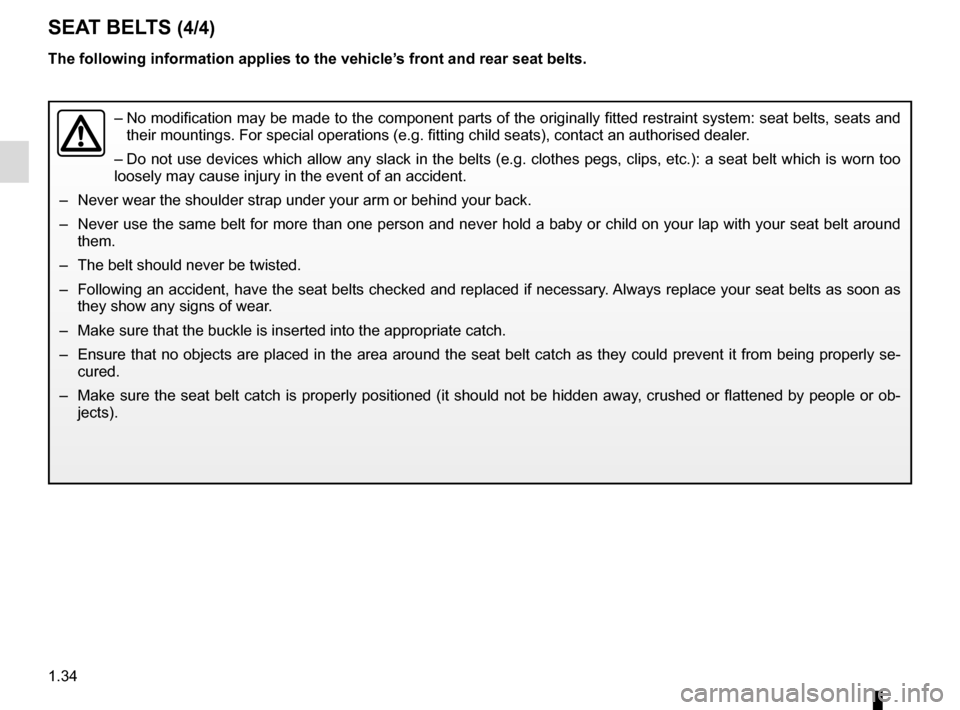
1.34
– No modification may be made to the component parts of the originally fit\
ted restraint system: seat belts, seats and
their mountings. For special operations (e.g. fitting child seats), co\
ntact an authorised dealer.
– Do not use devices which allow any slack in the belts (e.g. clothes peg\
s, clips, etc.): a seat belt which is worn too
loosely may cause injury in the event of an accident.
– Never wear the shoulder strap under your arm or behind your back.
– Never use the same belt for more than one person and never hold a baby o\
r child on your lap with your seat belt around them.
– The belt should never be twisted.
– Following an accident, have the seat belts checked and replaced if neces\
sary. Always replace your seat belts as soon as they show any signs of wear.
– Make sure that the buckle is inserted into the appropriate catch.
– Ensure that no objects are placed in the area around the seat belt catch\
as they could prevent it from being properly se- cured.
– Make sure the seat belt catch is properly positioned (it should not be \
hidden away, crushed or flattened by people or ob- jects).
The following information applies to the vehicle’s front and rear seat belts.
SEAT BELTS (4/4)